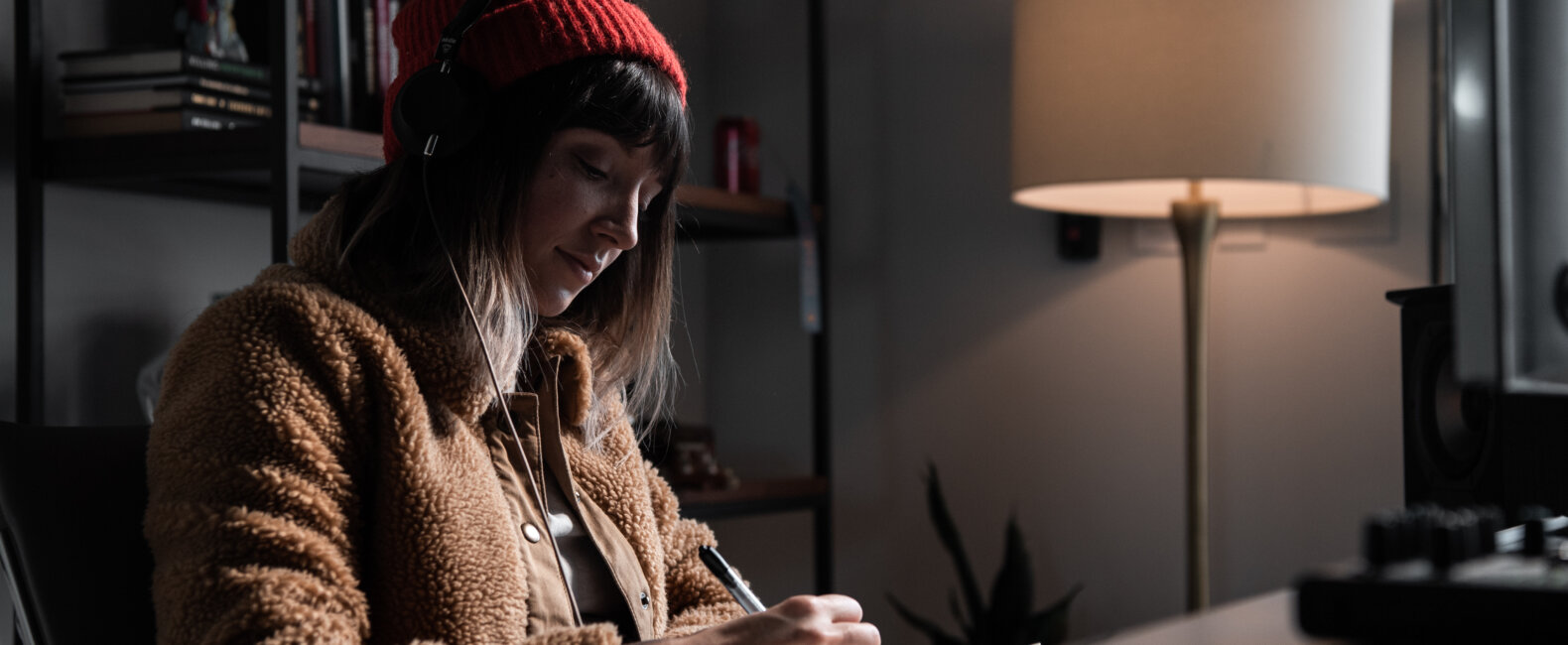Strange times like these are perfect for creatives. It’s in our nature to adapt and working from home requires its fair share of adaptation. You’re competing against loneliness, distractions, overly affectionate dogs — and that’s just the start of it.
The good news? You’re not alone. We reached out to some of our filmmaking friends to see what strategies they’re implementing from their home office. Just like any other craft, becoming a responsible and efficient remote worker is a skill. It takes practice. It takes time. So, don’t be discouraged if it’s difficult at first—it’s going to get easier.
In the spirit of making it easier, we’ve compiled 8 tips for doing just that. While you’re reading this, take a few notes about how this list can apply to your own workspace. Tape that list to your desk as a reminder, and then get back to work.
Commit to Your Workspace.
While this period of isolation and working from home won’t last forever, it helps to act like it will. What we mean is this: set up your workspace as if it were going to be your only workspace moving forward, then get dressed, and go to work. Establish a place you can work every day. Make it quiet. Set up photos of your family or your dog. The more you like your workspace, the more you’ll want to actually get work done there. Related, get dressed every day like you’re going to work. Working from the couch in your pajamas is not a long term solution — and will make it more difficult to focus and be productive.
Protect Your Time.
This is especially important for those of you with family or roommates, but it’s essential that you set guidelines and expectations in your home. You need to be incredibly clear about what your business hours are, what they aren’t, and then enforce that. If you’re someone who gets on a lot of important calls, make sure to tell the people in your space when those calls are. If you’re intentional during this step of the process, it’ll be better for everybody in the long run.
Set a Schedule.
When we reached out to Creative Director Ryan Smith, he said:
“You Have to have some type of schedule; I fought for years to create one and it’s so necessary. I start at 7 a.m. and go to 5:30 p.m. Then pick it back up around 9 p.m.”
Ok, not everyone needs to work a schedule as crazy as Ryan’s, but either way it’s an important lesson. Schedules create rhythms, and rhythms create habits—in this case, good ones. Once you commit to a schedule, you’re committing to a more efficient work life.
Clump Calls and Meetings.
Another tip from Mr. Smith. In most cases, phone calls and meetings don’t require as much mental effort as getting the actual work done. But, they’re incredibly good at derailing you. It’s a well-known figure that it takes, on average, 20 minutes to get back on-task after interruption. So, you may as well clump those distractions together. Set aside a block of time for calls and stick to it.
Start With the Hard Stuff.
We reached out to award-winning editor (and freelancer) Spencer MacDonald for his advice on remote work:
“I think the advice I have for remote work is to work quickly, intuitively, and instinctively so that your mind doesn’t have enough time to second guess what you’re doing. That way you can get into your own flow, and work out of that flow.”
Dive into the difficult stuff right away, while your brain’s fresh. With distractions and fatigue building throughout the day, it’s not going to get any better. So, tackle more difficult, brain-draining tasks as quickly as possible—because all of our creative brains have a shelf-life.
Work, Then Don’t Work.
It’s easy to let work come and go throughout the day. To let small breaks creep in, then back to work, and then back to a break. But, as Feral Creative’s Sarah Schutzki pointed out, it’s important to have a clear separation between when you’re working, and when you’re not working:
“I get a sense of lightness from striking a balance between being productive and recognizing it’s healthy to step away from the work altogether. And even then, when we step back—and perhaps especially when we do—we get some of our best ideas.”
In other words, maybe sometimes the most productive thing we can do is not work.
Set Goals.
Here’s what acclaimed editor Michael Ruscio (Six Feet Under, The Sopranos) told us about setting goals for himself:
“Give yourself small goals: ‘I’ll finish this sequence and then check my email. I’ll walk the dog and then get this scene into first cut.’ Most specifically, give yourself your own call sheet. Whatever you need to accomplish that day, you can, on your own terms, but make your day.”
Goals provide a roadmap for our work, and they also hold us accountable. As soon as we set a goal for our day, we’re putting our feet to the fire because all of a sudden there’s something to fall short of—or something to accomplish.
When In Doubt, Communicate.
Just because you’re working from home doesn’t mean you need to be isolated. If you’re on a creative team, be sure you’re over-communicating about what tasks you’re working on, what issues you’re dealing with, and most importantly how you’re holding up. Simply put, check-in with each other.
For freelancers, you may need to get a little bit more creative. Call your peers to check-in and ask advice about projects you’re stuck on. Or, maybe even set up a Slack channel so you can connect and share useless GIFs. Do whatever it takes to get out of your silo.
Like we said at the start, being a remote worker is a skill that takes practice, just like anything else. The more you do it, the easier it’ll become. So, don’t be discouraged if it doesn’t come easily at the start—neither did learning how to edit or pull focus. Give yourself some grace and keep doing what creatives do best. Everything will come together.





















































































